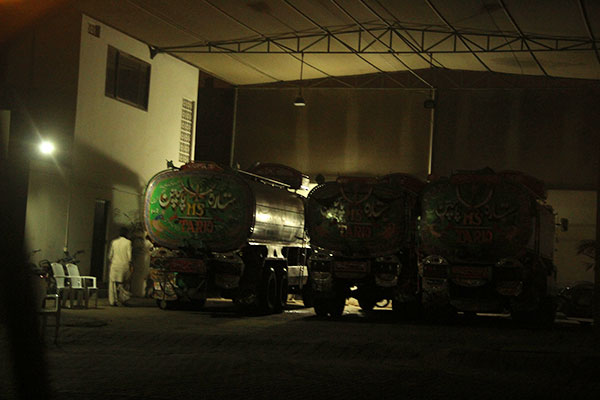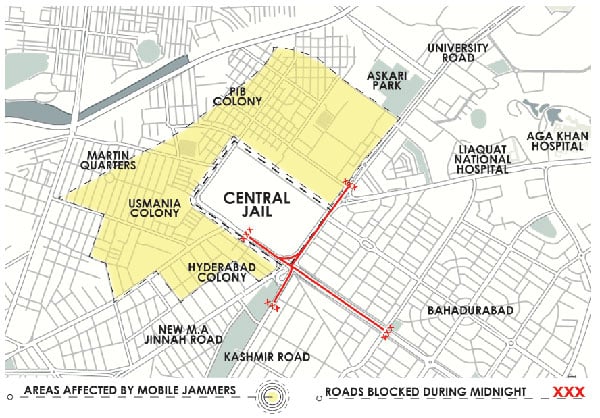PS-117 and the ‘prisoners’ of Jail Road
With no cell phone signals, residents being made to suffer for jail security
Karachi
Muhammad Tariq stood stunned and in a state of shock outside the Parda Park near the Karachi central jail on New MA Jinnah Road where his younger brother and cousin had met with a terrible road accident almost half an hour ago.
He was told by passers-by that the boys - his 16-year-old brother Muhammad Amir and 15-year-old cousin Muhammad Naeem - had been taken to hospital in an ambulance after their motorcycle was hit by a water tanker.
“It took my family around half an hour to contact me as I was sitting with a friend off Jamshed Road and cell phones don’t work there,” said Tariq, who is a muezzin at the Memon Majid located nearby the place where he was present with his friend.
As soon as Tariq moved out of the mobile jammers’ range, he received a friend’s call informing him about the accident.
“As I rushed to the scene and found my motorcycle lying on the road, the signals again went dead and I was standing dumbfounded with no clue as to whether the boys were dead or alive.”
The accident occurred on August 11, 2015 in an area of Karachi where mobile phones do not receive signals.
Following a Tehreek-e-Taliban Pakistan attack on the Bannu central prison in April 2012, Karachi’s central jail authorities installed mobile jammers at the prison for security reasons, after which cellular services and wireless internet signals are inaccessible in parts of Jamshed Road, PIB Colony, Jahangir Road, Usmania Mohajir Colony and other areas.
These areas fall in the PS-117 constituency, where the by-election for the vacated seat of former Muttahida Qaumi Movement leader Dr Sagheer Ahmed is scheduled to be held on June 2.
Recalling the trouble he had went through because of the absence of cellular connectivity, Tariq said as his cell phone was not working at the site of the accident, he left the area in search for signals.
As soon as he went out of the mobile jammers’ range, he received his brother’s call who told him that the boys had been taken to the Jinnah Postgraduate Medical Centre.
The New MA Jinnah Road, where the accident took place, heads toward University Road form the Islamia College roundabout. The road is blocked every night after 12am till morning at the intersection of the bridge near the Karachi central jail over security reasons.
The bridge alongside the central prison, which connects PIB Colony and Bahadurabad from one side and Kashmir Road and the New M Jinnah Road through its loops, is closed every night around 10pm and commuters have to take longer routes to cover short distances.
In July, 2013, Taliban attacked the Dera Ismail Khan central prison and the security for the Karachi prison was further increased, creating several problems for residents and shopkeepers around the bridge.
Because of the closure of the bridge and one track of New MA Jinnah Road, two-way traffic runs on a single lane. Many accidents have been reported in the area. Tariq’s cousin died in the accident and his brother suffered severe injuries and it took him over six months to recover.
Hospital without cellular connectivity
The attendants of patients at the Osmania General Hospital, which is located opposite the central prison, also face troubles because of the jammers.
“It’s been around four years that we are seeing attendants suffering because of the jammers,” a hospital staffer told The News requesting anonymity.
“The doctors and the other employees of the hospital too are fed up with these jammers. It’s a big problem but nobody speaks about it.”
The hospital, which is working under a trust, mostly caters to patients belonging to the lower-income class.
An attendant, Ghulam Rasool, whose mother was admitted to the hospital because of a liver infection, said he was a resident of Patel Para and had taken her mother to the hospital as it was near his home and affordable.
“I can’t contact my family or contractors for whom I work as a labourer,” he added.
Water tanker ‘mafia’
The driver of the water tanker, which hit Naeem and Amir, had escaped from the scene. A number of water tankers run in the area as illegal hydrants operate openly on a road between Teen Hatti Bridge and Lasbela. Many tankers are parked on both sides of the road and filled at the hydrants.

Illegal hydrants such as this one operate openly on the road between the Teen Hatti Bridge and Lasbela. With no one to regulate their parking, tankers are usually parked on either side of the road, causing severe inconvenience for commuters - Photo by Uzair Rajput
Water tankers can also be seen parked on a narrow road in Martin Quarters, considered a stronghold of the Muttahida Qaumi Movement. The road is in a dilapidated condition for the last two years.
An MQM activist said the tanker mafia was backed by members of the Pakistan People’s Party.
“The MQM has done whatever it could do to remove the tankers. But the water tanker owners’ are supporters of the ruling PPP,” he added.
Residents complained that because of water tankers and illegal hydrants in the area, water shortage has become a regular problem.
Hotspots for muggers
Faraz Mansoor, a resident of the PS-117 constituency, said the areas around the central jail had become hotspots for cell phone snatchers as residents who moved out of their homes at night searching for signals were frequently robbed.
“I don’t know who the real prisoners are… the ones kept at the central jail or the residents living near the prison without cellular connectivity,” he added.
Mansoor regretted that no political party participating in the upcoming by-elections had taken up the issues of the cell phone jammers and the water tanker mafia.

-
 Jessica Alba, Cash Warren Finalize Divorce After 16 Years Of Marriage
Jessica Alba, Cash Warren Finalize Divorce After 16 Years Of Marriage -
 China’s AI Boom Takes Center Stage At Spring Festival One Year After DeepSeek Stirred The Industry
China’s AI Boom Takes Center Stage At Spring Festival One Year After DeepSeek Stirred The Industry -
 James Van Der Beek Called His Sixth Child Jeremiah 'healing For Us' Before His Death
James Van Der Beek Called His Sixth Child Jeremiah 'healing For Us' Before His Death -
 Elon Musk Vs Reid Hoffman: Epstein Files Fuel Public Spat Between Tech Billionaires
Elon Musk Vs Reid Hoffman: Epstein Files Fuel Public Spat Between Tech Billionaires -
 Gordon Ramsay Denies Victoria Beckham Got Handsy With Brooklyn At His Wedding
Gordon Ramsay Denies Victoria Beckham Got Handsy With Brooklyn At His Wedding -
 Gordon Ramsay Makes Unexpected Plea To Brooklyn As He Addresses Beckham Family Feud
Gordon Ramsay Makes Unexpected Plea To Brooklyn As He Addresses Beckham Family Feud -
 Prince Harry Warns Meghan Markle To 'step Back'
Prince Harry Warns Meghan Markle To 'step Back' -
 Selena Gomez Explains Why She Thought Lupus Was 'life-or-death'
Selena Gomez Explains Why She Thought Lupus Was 'life-or-death' -
 New Zealand Flood Crisis: State Of Emergency Declared As North Island Braces For More Storms
New Zealand Flood Crisis: State Of Emergency Declared As North Island Braces For More Storms -
 Nancy Guthrie Case: Mystery Deepens As Unknown DNA Found At Property
Nancy Guthrie Case: Mystery Deepens As Unknown DNA Found At Property -
 James Van Der Beek's Brother Breaks Silence On Actor's Tragic Death
James Van Der Beek's Brother Breaks Silence On Actor's Tragic Death -
 Megan Thee Stallion On New Romance With Klay Thompson: 'I'm Comfy'
Megan Thee Stallion On New Romance With Klay Thompson: 'I'm Comfy' -
 Nicole Kidman Celebrates Galentine’s Day Months After Keith Urban Split
Nicole Kidman Celebrates Galentine’s Day Months After Keith Urban Split -
 Justin Bieber Unveils Hailey Bieber As First Face Of SKYLRK In Intimate Campaign Debut
Justin Bieber Unveils Hailey Bieber As First Face Of SKYLRK In Intimate Campaign Debut -
 Caitlin O’Connor Says Fiance Joe Manganiello Has Changed Valentine’s Day For Her
Caitlin O’Connor Says Fiance Joe Manganiello Has Changed Valentine’s Day For Her -
 Rachel Zoe Sends Out Message For Womne With Her Post-divorce Diamond Ring
Rachel Zoe Sends Out Message For Womne With Her Post-divorce Diamond Ring



